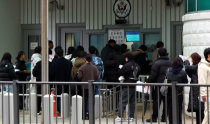The end of Swiss bank secrecy
The secrecy of Swiss banks goes back hundreds of years. European royal courts and aristocrats began to put their money in Swiss banks in 1815, when an international treaty recognized Switzerland as a permanently neutral country. To cater to their customers needs, Swiss banks make secrecy their core business strategy. After World War I, France showed interest in Swiss bank accounts as a source of taxes. Adolf Hitler, who took power in Germany in 1933, also had his eye on the accounts of Jews in Swiss banks. Surprised by such moves, Switzerland enacted a law the following year that required banks to maintain confidentiality of customer information.
Nazi leaders later changed their way of thinking and put wealth taken from Jews into Swiss banks. Both the Jews and Nazis became customers of Swiss banks. After World War II, the customer base of Swiss banks was expanded far more extensively. Dictators who sprang up in many newly founded countries and corporate criminal organizations abroad all rushed to Swiss banks to keep their money, giving Swiss banks the bad name of haven for black money. Intensifying international criticism of the Swiss bank strategy of attracting black money began to create cracks in their once-impregnable secrecy.
In 2009, the U.S. government sued UBS, the largest bank in Switzerland, demanding that the bank hand over a list of some 52,000 customers with U.S. citizenship suspected of tax evasion. Bern negotiated with Washington, resulting in the handover of information on 4,000 people. After the Organization for Economic Cooperation and Development included Switzerland in its gray list of tax havens, the country got off the list by signing tax agreements with countries in compliance with OECD standards. In the same vein, the governments of Korea and Switzerland have revised their tax agreement, allowing Seoul access to data about Swiss bank accounts held by Korean tax evaders.
The Korean National Tax Service collected 213.7 billion won (185.7 billion U.S. dollars) in additional taxes from a businessman who raised illegal funds through an offshore paper company and parked money in a Swiss bank account in 2010. Tax authorities tracked him for six months after forming a task force for offshore tax evasion. Prior to the case, the tax office was hardly able to track down tax evaders. A Korean official said, Even if an account was opened (in a Swiss bank) decades ago, we can request tax information on interest income only if the account was maintained until after 2011. If so, can Korean tax authorities shed light on slush funds raised by former presidents and their cronies who stashed the money in Swiss banks?
Editorial Writer Heo Seung-ho (tigera@donga.com)







